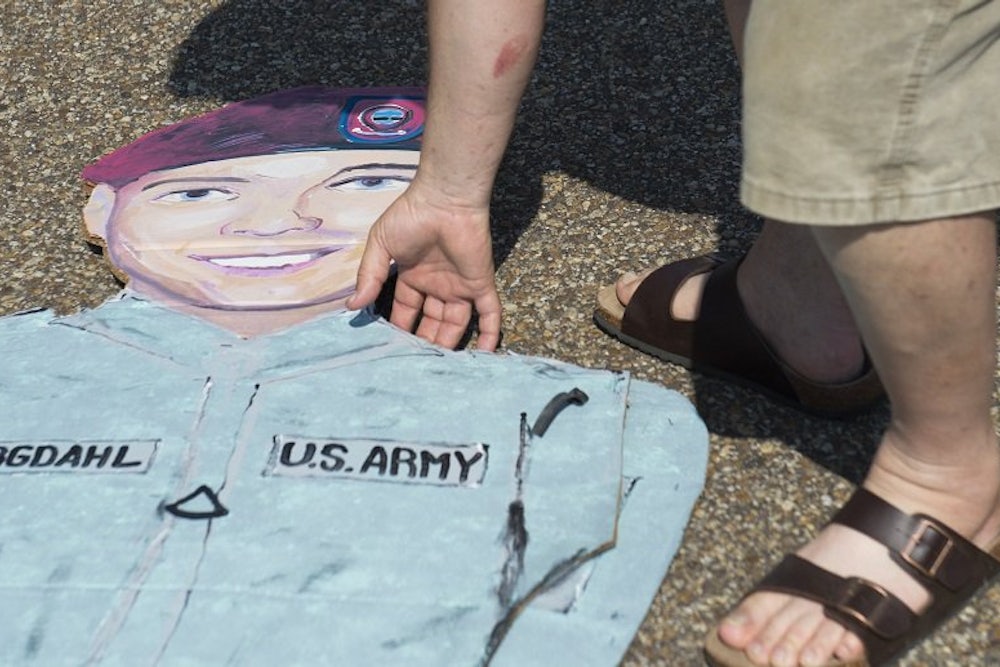When the story of Bowe Bergdahl became big news last year, a crass friend of mine told me it was “gold—cowardly yellow gold.” I'd just written a book that argues that cowardice is an important and overlooked idea, and here was a ballet-dancing fugitive who had slipped away from his unit in Afghanistan under cover of night, abandoning his weapon, his armor, and his fellow soldiers. The United States Army Forces Command announced this week that he has now been charged with desertion and misbehavior before the enemy. That's not cowardly conduct under the Uniform Code of Military Justice—not technically, anyway. But the idea of cowardice still follows Bergdahl (note the Bowe Bergdahl is NOT a Hero Facebook page), clouding our understanding of his story with heat rather than light.
This is often the case with cowardice. Recall the way intellectuals from Dinesh D'Souza to Susan Sontag were criticized for objecting to the 9/11 terrorists being labeled cowards; Bill Maher's talk show went off the air because he took that stand. “Coward” seemed the right word because it is a term of the deepest contempt, largely because of the damage he—and it is usually a he—can cause. The Greek poet Tyrtaeus wrote in the seventh century B.C. that a man in a phalanx who gives in to fear can destroy “the spirit of the whole army.” George Washington later echoed the sentiment when he called cowardice “the most injurious” of crimes “inasmuch as it may and often does happen that the cowardice of a single Officer may prove the Destruction of the whole Army.”
Adding to our contempt is what might be called the style of the proverbial coward, who, if he can’t run away, pisses or shits himself. The coward thus is disgusting as well as harmful—a wretched combination that helps explain why we pin the term “coward” on terrorists and others evildoers; why, as Urbandictionary.com puts it, the word is “the most insulting word known to man”; and why we think of cowardice as the worst possible failing. It wasn’t General George S. Patton who said, “Where there is a choice between cowardice and violence, I would advise violence.” It was Mahatma Gandhi.
Bergdahl seems even to have accused himself of cowardice. As The Washington Post reported last June, he sent a friend a laptop a few weeks before he left his unit. On it was a file in which he wrote, “Compared to hell of the real wars of the past, we are nothing but camping boy scots [sic]. Hiding from children behind our heavy armored trucks and our c-wire and sand bagged operating post, we tell our selves that we are not cowards.”
What, exactly, is cowardice? Drawing on a tradition that goes as far back as Homer, one can fairly define it as the failure, born of excessive fear, to do one's duty. Ideas of duty can conflict; the notion of excessive fear is inherently subjective. Still, it is clear that Bergdahl’s conduct does not fit this definition, nor does he seem to have what in an earlier time would have been called a cowardly character.
He does not seem to have been prone to fear, excessive or otherwise. Before being taken prisoner, Bergdahl was apparently an adventurous free spirit who was in some respects a gung-ho soldier, a crack shot eager to knock on doors to make connections with the local population, and, if necessary, to knock down doors, too. He did participate in propaganda videos for the Taliban who captured him, but it seems likely he was coerced. He tried to escape multiple times and was punished for it.
Dropping one's sword and shield is classic cowardice, and it's true that on the night he left his unit, Bergdahl left his machine gun and body armor. But this seems to have been because he thought doing so might cause trouble for fellow soldiers. Leaving his “sensitive equipment” behind was not a case of what Roman law described as “disarming himself and arming the enemy.” His disappearance did indeed seem to have caused his fellow soldiers trouble; they spent time and effort on dangerous search missions. But the accusations that some soldiers died looking for him seem to have been unfounded.
The classic cowardly style of movement is running, but not even Bergdahl's detractors use that verb to describe how he left. After the moon set, carrying knives, water, a diary, and a compass, he walked away. It could be that Bergdahl was delusional, suffering from the same psychological trouble that got him kicked out of the Coast Guard, or from some new trouble caused by his Army experience. The Uniform Code of Military Justice under which Bergdahl is being charged makes clear that “genuine and extreme illness” can be a legitimate defense against the charge of cowardice. Medical examinations may have made clear if Bergdahl was suffering from such an illness. He was almost certainly disillusioned. Perhaps he was following the advice of his father in an email just before Bergdahl left the observation post. “OBEY YOUR CONSCIENCE,” read the subject line.
Clearly, Bowe Bergdahl failed in his duty as a soldier for the U.S. Army, but nothing else about his character, his history, or the circumstances suggests that he failed out of fear. He simply left. We reach for the word “coward” reflexively, simplistically. It's easier to do that than to contemplate a deserter who can be clear of mind and deliberate in his purpose, just as sure as a man can go charging into battle frightened out of his wits.
